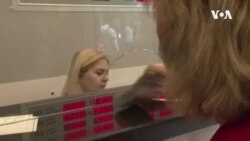ສະກຸນເງິນ ລີຣາ ຂອງປະເທດເທີກີ ແມ່ນຖືກກະທົບຕົກລົງຕໍ່າ ຢ່າງ ເປັນປະຫວັດການເມື່ອທຽບໃສ່ກັບເງິນໂດລາສະຫະລັດ ໃນບໍ່ເທົ່າໃດວັນຜ່ານ ມານີ້. ນັ້ນໄດ້ກໍ່ໃຫ້ເກີດຄວາມວິຕົກຕໍ່ບັນດາເຈົ້າຂອງທຸລະກິດຊາວເທີກີ. ນັກຂ່າວວີໂອເອ ເອແຊລ ຊາຮິນຄາຢາ ມີລາຍງານ, ເຊິ່ງ ພຸດທະສອນ ຈະນຳລາຍລະອຽດມາສະເໜີທ່ານໃນອັນດັບຕໍ່ໄປ.
ໃນວັນທີ 30 ພະຈິກທີ່ຜ່ານມາ, ສະກຸນເງິນລີຣາຂອງເທີກີໄດ້ລົງໄປສູ່ຈຸດຕໍ່າທີ່ສຸດຂອງອັດຕາແລກປ່ຽນນັບຕັ້ງແຕ່ປີ 1994 ເປັນຕົ້ນມາ ເຊິ່ງແມ່ນ 14 ລີຣາ ຕໍ່ 1 ໂດລາສະຫະລັດ. ນີ້ແມ່ນການເພີ່ມ ຂຶ້ນຄັ້ງໃຫຍ່ຈາກສາມ ເດືອນສຸດທ້າຍຂອງປີທີ່ຜ່ານມາ, ເວລາທີ່ອັດຕາແລກປ່ຽນສະເລ່ຍແມ່ນ 8 ລີຣາ.
ທ່ານ ຮູຊາເມັດຕິນ ອາກິນຊີ, ເຈົ້າຂອງຮ້ານຂາຍໂທລະສັບມືຖື ໄດ້ກ່າວວ່າ “ປັດຈຸບັນນີ້, ຕະຫຼາດແມ່ນໄດ້ຢຸດຊະງັກຢູ່ຢ່າງສິ້ນເຊີງ. ພວກເຮົາຢູ່ໃນສະຖານະທີ່ພວກເຮົາບໍ່ສາມາດເຮັດທຸລະກິດຫຍັງໄດ້. ມັນເຫັນໄດ້ຊັດຈາກລູກຄ້າຂອງພວກເຮົາ.“
ລາຄາສຳລັບສິ່ງຂອງທີ່ຈຳເປັນ ເຊັ່ນ ແປ້ງ, ນໍ້າມັນ ແລະ ນໍ້າຕານ ໄດ້ພຸ້ງຂຶ້ນໃນທົ່ວປະເທດ.
ທ່ານ ຮູເຊຢິນ ຊາເກຍ, ເຈົ້າຂອງຮ້ານຂາຍເຂົ້າຈີ່ ໄດ້ກ່າວວ່າ “ພວກເຮົາໄດ້ຂຶ້ນລາຄາເຂົ້າຈີ່ 21 ເປີເ ຊັນ ໃນຂະນະທີ່ຄ່າລົງທຶນຂອງພວກເຮົາໄດ້ເພີ່ມຂຶ້ນ 40 ເປີເຊັນ. ຕອນນີ້, ພວກເຮົາມີແຕ່ພະຍາ ຍາມປະຄອງຊີວິດຂອງພວກເຮົາເທົ່ານັ້ນ.”
ການຕົກຕ່ຳລົງລາຄາຂອງສະກຸນເງິນລີຣາຂອງເທີກີ ຕໍ່ໂດລາສະຫະລັດ ແມ່ນກຳລັງສົ່ງຜົນກະທົບຕໍ່ທຸລະກິດໃນຂົງເຂດທີ່ກວ້າງຂວາງ, ລວມທັງການກໍ່ສ້າງ, ເພາະວ່າວັດສະດຸຕ່າງໆແມ່ນມີລາຄາເປັນເງິນໂດລາ.
ທ່ານ ຮິສມັນ ໂອເຊີ, ຜູ້ສະໜອງວັດຖຸກໍ່ສ້າງໄດ້ກ່າວວ່າ “ການຂະຫຍາຍຕົວໃນອັດຕາແລກປ່ຽນ ຫຼື ການຂະຫຍາຍຕົວໃນເງິນໂດລາແມ່ນໄດ້ສົ່ງຜົນກະທົບໂດຍກົງຕໍ່ລາຄາຂອງເຫຼັກ, ຊີເມັນ ແລະ ດິນບັອກເພື່ອກໍ່ສ້າງ. ໃນຂະນະທີ່ສິ່ງທີ່ວ່ານີ້ ໄດ້ສົ່ງຜົນກະທົບໂດຍກົງ, ບັນດາຜູ້ຮັບຈ້າງກໍ່ສ້າງໄດ້ຫຼຸດຜ່ອນທຸລະກິດຂອງເຂົາເຈົ້າໃນອຸດສາຫະກຳການກໍ່ສ້າງ. ການຂາຍຂອງພວກເຮົາແມ່ນໄດ້ຊ້າລົງຢ່າງຫຼີກລ່ຽງບໍ່ໄດ້ໃນຂະນະທີ່ເຂົາເຈົ້າໄດ້ຫຼຸດຜ່ອນການເຮັດທຸລະກິດຂອງເຂົາເຈົ້າລົງ.”
ບັນດານັກຊ່ຽວຊານກ່າວວ່າ ການຕົກລົງຄັ້ງໃໝ່ຂອງຄ່າສະກຸນເງິນ ລີຣາ ແມ່ນໄດ້ເກີດຂຶ້ນຍ້ອນການປະກາດຂອງປະທານາທິບໍດີ ເທີກີ ທ່ານ ຣີເຊັບ ໄຕຢິບ ເອີດູອານ ທີ່ວ່າທ່ານຈະຕັດອັດຕາດອກເບ້ຍລົງ.
ທະນາຄານກາງຂອງເທີກີ ແມ່ນໄດ້ຕັດອັດຕາດອກເບ້ຍລົງແລ້ວສາມຄັ້ງແລ້ວ ນັບຕັ້ງແຕ່ເດືອນກັນຍາທີ່ຜ່ານມາ ຕາມການຊີ້ນຳຂອງທ່ານເອີດູອານ, ຊຶ່ງເຮັດໃຫ້ເກີດຄວາມເປັນຫ່ວງອີກຄັ້ງນຶ່ງ ກ່ຽວກັບ ຄວາມເປັນອິດສະຫຼະຂອງທະນາຄານ.
ທ່ານ ຣີເຊັບ ໄຕຢິບ ເອີດູອານ ປະທານາທິບໍດີຂອງເທີກີ ກ່າວວ່າ “ໂລກຮູ້ວ່າຂ້າພະເຈົ້າອຶດອັດມຈຫຼາຍຊໍ່າໃດ ກ່ຽວກັບອັດຕາດອກເບ້ຍສູງ. ຂ້າພະເຈົ້າແມ່ນບໍ່ເຄີຍເປັນຜູ້ສະໜັບສະໜູນອັດຕາດອກເບ້ຍ. ຂ້າພະເຈົ້າບໍ່ໄດ້ເປັນໃນມື້ນີ້ ແລະ ຈະບໍ່ເປັນໃນມື້ອື່ນ.”
ທ່ານ ເອີດູອານ ເຊື່ອວ່າອັດຕາດອກເບ້ຍສູງແມ່ນໄດ້ເປັນສາເຫດຂອງເງິນເຟີ້. ທ່ານເວົ້າວ່າການຮັກສາອັດຕາດອກເບ້ຍຕໍ່າ, ຈະກະຕຸ້ນການເຕີບໂຕ.
ແຕ່ນັກວິເຄາະບາງຄົນເວົ້າວ່າ ທັດສະທະຄະຕິຂອງທ່ານ ເອີດູອານ ແມ່ນບໍ່ເປັນໄປຕາມກົດທົ່ວ ໄປ, ເນື່ອງຈາກອັດຕາເງິນເຟີ້ຂອງປະເທດແມ່ນສູງກວ່າ 21 ເປີເຊັນ, ດັ່ງທີ່ຖືກລາຍງານໂດຍຫ້ອງການສະຖິຕິຂອງເທີກີ ໃນວັນທີ 3 ທັນວາທີ່ຜ່ານມານີ້.
ທ່ານ ສຕີຟ ແຮັງຄ໌, ອາຈານສອນເສດຖະສາດຢູ່ມະຫາວິທະຍາໄລ ຈອນສ໌ ຮັອບກິນສ໌ ກ່າວວ່າ “ມັນບໍ່ໄດ້ເປັນບັນຫາເສດຖະກິດຫຼາຍປານໃດ. ມັນມາຈາກບ່ອນອື່ນ. ມັນບໍ່ໄດ້ມາຈາກເສດຖະ ກິດ ເພາະວ່າໃນເສດຖະກິດ, ພວກເຮົາທຸກຄົນຮູ້ວ່າຖ້າເຈົ້າຂະຫຍາຍການສະໜອງເງິນ, ອັດຕາເງິນເຟີຈະເພີ່ມຂຶ້ນ, ແລະ ຫຼັງຈາກນັ້ນສິ່ງສຸດທ້າຍທີ່ເກີດຂຶ້ນກໍແມ່ນວ່າ ອັດຕາດອກເບ້ຍຈະເພີ່ມ ຂຶ້ນ. ອັນນັ້ນ ມັນແມ່ນລຳດັບຂອງມັນ. ທ່ານ ແມ່ນມີລຳດັບທີ່ປີ້ນກັບກັນຢ່າງສິ້ນເຊີງ.”
ເຖິງແມ່ນສະກຸນເງິນຈະເສຍມູນຄ່າເກືອບ 45 ເປີເຊັນໃນປີນີ້ກໍຕາມ, ການຄາດການຢ່າງເປັນທາງການໄດ້ສະແດງໃຫ້ເຫັນເສດຖະກິດຂອງ ເທີກີ ເຕີບໂຕ 7.4 ເປີເຊັນໃນ 6 ຫາ 9 ເດືອນຂອງປີ.
ທ່ານ ເອີດູອານ ມອງເຫັນວ່າມັນເປັນຄວາມສຳເລັດທາງດ້ານນະໂຍບາຍ, ແຕ່ບັນດານັກຊ່ຽວຊາຍເຕືອນວ່າ ການຕົກລົງຂອງຄ່າເງິນລີຣາ ແລະ ການເພີ່ມຂຶ້ນຂອງລາຄາຕ່າງໆ ອາດເຮັດໃຫ້ການເຕີບໂຕນັ້ນຢຸດສະງັກໄດ້.
ທ່ານ ສຕີຟ ແຣັ້ງຄ໌ ກ່າວວ່າ “ຖ້າລັດຖະບານບໍ່ປ່ຽນແປງນະໂຍບາຍຂອງເຂົາເຈົ້າ, ສະກຸນເງິນ ລີຣາ ຈະຕົກລົງເລື້ອຍໆ ແລະອັດຕາເງິນເຟີ້ຈະເພີ່ມຂຶ້ນເລື້ອຍໆ. ພວກເຮົາຈະເວົ້າວ່າ ຄວາມເຄັ່ງຕຶງໃນສາທາລະນະຊົນທີ່ກວ້າງຂວາງແມ່ນຈະມີຄວາມຮຸນແຮງ ເພີ້ມຂຶ້ນ.”
ຜູ້ປະທ້ວງບາງຄົນໄດ້ອອກມາຖະໜົນຕ່າງໆໃນຫຼາຍຕົວເມືອງ, ລວມທັງ ນະຄອນອິສຕານບູລ, ເພື່ອກ່າວປະນາມການຕົກລົງຂອງຄ່າເງິນ ລີຣາ ແລະ ຮຽກຮ້ອງໃຫ້ລັດຖະບານລາອອກ, ແຕ່ຕໍາຫຼວດໄດ້ເຮັດໃຫ້ເຂົາເຈົ້າແຍກຍ້າຍຈາກກັນໄປ.
ກຸ່ມຝ່າຍຄ້ານໄດ້ຮຽກຮ້ອງການເລືອກຕັ້ງກ່ອນກຳນົດ, ແຕ່ທ່ານ ເອີດູອານ ໄດ້ປະຕິເສດໃນປັດຈຸ ບັນນີ້, ໂດຍຢືນຢັດວ່າປະເທດຈະຈັດການເລືອກຕັ້ງໃນປີ 2023 ຕາມທີ່ໄດ້ວາງແຜນໄວ້.
ໃນຂະນະດຽວກັນ, ພວກເຈົ້າຂອງທຸລະກິດແມ່ນໄດ້ລໍຖ້າດ້ວຍຄວາມຮູ້ສຶກວົນວາຍໃຈເພື່ອເບິ່ງວ່າຕະຫຼາດຈະມີປະຕິກິລິຍາຕອບຕໍ່ນະໂຍບາຍອັດຕາດອກເບ້ຍຂອງລັດຖະບານແນວໃດ.
The Turkish lira has been hitting new record lows against the U.S. dollar in recent days. That is raising alarm among Turkish businessowners. VOA’s Ezel Sahinkaya has this report, narrated by Begum Ersoz.
On November 30th, the Turkish lira touched its lowest rate since 1994 of 14 liras to the U.S. dollar. This is a huge increase over the last quarter of the previous year, when the average rate was 8.
Turkish business owners say it’s hard to stay open in this environment because the Lira’s depreciation has caused prices to skyrocket.
“Nowadays, the market is completely deadlocked. We are really in a position where we can't do any business. It is obvious from our customers.”
Prices for essential goods, such as flour, oil and sugar, have risen throughout the country.
“We increased the bread price by 21% while our input costs were increased by 40%. Right now, we are just trying to maintain our lives.”
The depreciation of the Turkish lira against the U.S. dollar is impacting a broad range of businesses, including construction, because materials are priced in dollars.
“The increase in the exchange rate or the increase in the dollar directly affected the price of iron, cement and building blocks. As these were directly affected, contractors slowed down their business in the construction industry. Our sales inevitably slow down as they slow down their business.”
Experts say the lira’s new low was triggered by Turkish President Recep Tayyip Erdogan’s announcement that he would be cutting interest rates.
Turkey's Central Bank has already slashed interest rates three times since September on Erdogan's directives, reigniting fears about the bank's independence.
"The world knows how uncomfortable I am with high interest rates. I have never been pro-interest rates. I wasn't today and I won't be tomorrow."
Erdogan believes that higher interest rates are causing inflation. Keeping interest rates low, he says, will stimulate growth.
But some analysts say Erdogan's views are unconventional, given that the country's inflation rate is above 21%, as reported by Turkey's statistics office on December 3.
"It's not really an economics issue. It's coming from someplace else. It is not coming from economics because in economics, we all know that if you increase the money supply, inflation increases, and then the last thing that happens is that the interest rates go up. So that’s a sequence. He has the sequence exactly upside down.”
Despite the currency’s plunge in value by nearly 45 percent this year, official estimates show Turkey's economy grew by 7.4% in the third quarter.
Erdogen sees it as a policy success, but experts warn the falling lira and rising prices could stop that growth.
“If the government does not change its policy, the lira is going to keep going down and inflation will keep going up. Tensions, shall we say, in the greater public will be more inflamed.”
Some protesters took to the streets in numerous cities, including Istanbul, to condemn the collapse of the lira and demand the government's resignation, but police dispersed them.
Opposition groups have called for early elections, but Erdogan so far has refused, insisting the country will hold elections in 2023 as planned.
Meanwhile, business owners nervously wait to see how markets will react to the government’s interest rate policies.










